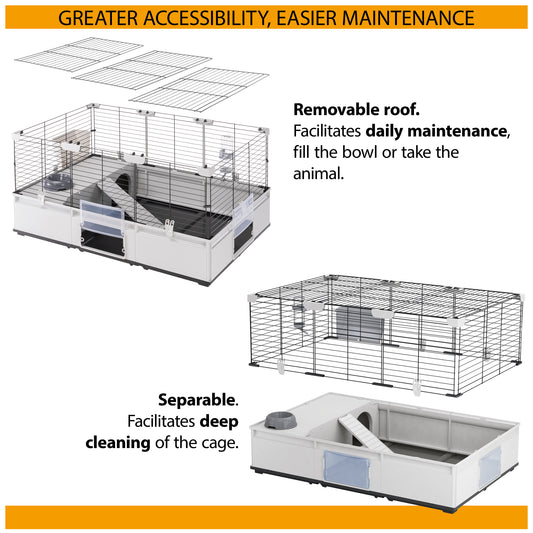Cats love to be warm and cosy, and quite often their favourite place to curl up is on their owner’s bed. Studies show that two thirds of cat owners sleep with their pets but there is conflicting advice about whether this is a good idea. Let’s take a closer look at some of the issues.
Sleep disruption
Cats are crepuscular, meaning they are most active during sunrise and sunset, and often during the night. This isn’t compatible with a natural human sleep cycle so you could find that you are woken up during the night or very early in the morning if your cat wants to play or is hungry.
You can help limit sleep disruption by tiring your cat out with an hour’s play just before bed so they are more likely to settle. It is a good idea to keep your bedroom door ajar so your cat can leave for food, water or to use their litter tray during the night without having to disturb you.
Feeling safe and happy
If your cat chooses to snuggle up with you at night it is likely to be because they feel connected to you. Cats are sensitive to noise and can become attuned to the sound of their owner’s snores. It is thought that they find this soothing, giving them a sense of security.
A purring cat is a proven stress reliever, and bonding with your pet by sleeping with them can help you fall asleep more easily. A cat’s purr has between 20 and 30 vibrations per second and this constant vibration can help to lower an owner’s blood pressure. Co-sleeping strengthens the bond between pet and owner, as well as having a relaxing effect on the nervous system.
Having your pet close to you while you rest can help protect against loneliness, anxiety and depression too, especially for people who are prone to nightmares.
Keeping warm
A cat’s natural body temperature is 102 degrees F, which is significantly warmer than a human’s body temperature of 98.6 degrees F. This is why cats always seem to seek warmth. By having a cat on your bed, it can act as a kind of furry hot water bottle as they will warm the bed up for their owners too.
Babies and young children
You should never let your cat have access to a room where your baby or young child is sleeping due to the risk of them unintentionally causing suffocation. A baby or child could also be bitten or scratched in the night if they inadvertently startle a sleeping cat.
Disease transmission
Cats can pick up nasty bacteria from soil and their litter boxes, which they can transfer on to your bedding. It’s a good idea to give your cat’s paws a wipe before they jump up on to the bed to remove any debris.
Ensure your pet’s parasite control is up-to-date so that you know they’re free of fleas and worms before snuggling up to them in bed or you might wake up in the night scratching. You should make sure their vaccinations are up-to-date too as some diseases that affect cats can be passed on to humans.
For good hygiene it is recommended that you change your bedding more often than usual if you have your cat sleeping with you and wash it on a higher temperature.
People with compromised immune systems are particularly at risk from infections that could be passed on by cats so should keep their pets out of the bedroom altogether. Those with allergies or asthma should also avoid bed sharing as cat hair is likely to aggravate symptoms.
A place of their own
If you decide you would rather not have your cat sleep on your bed with you, or you have a cat who isn’t keen on bed sharing, there is a wide range of comfy and cosy alternatives. The Ohana Athens Cat Bed with its high sides is superbly warm and cosy, while the Danish Design Teepee Cat Bed and Danish Design Cat Pebble Bed are perfect for pets that like to hide away. If you have a particularly chilly cat, they’ll love the Kumfy Kradle bed which can attach to your radiator.
Choosing to sleep with your cat can be mutually beneficial and shouldn’t be a problem if you guard against the transmission of disease and parasites – and don’t mind the odd disturbance during the night!
If you enjoyed this article, have a look at:









